Dischord: Prism Coffeehouse seeks harmony
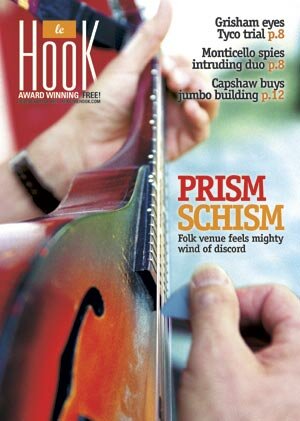
For the past four decades, the Prism Coffeehouse has been a leading Charlottesville music venue, attracting big name acts and serving as an anchor for the folk music community. But in the past month, a mighty wind of discord has begun to gust behind the scenes, threatening to shake the Coffeehouse to its very foundations.
"It's like a third-world country," charges Jim Quarles, a recently resigned Prism board member. "It's analogous to a dictatorship."
Quarles and his wife quit the organization's board in January after raising questions about the Prism's management. Their resignations drew an obscenity-laced response from the Prism's artistic director, its de facto chief executive.
Quarles, 51, says he finds the situation particularly troubling because the Prism played such a large role in his decision to move to Charlottesville. An amateur guitarist and music aficionado, Quarles says he had heard about the Prism's rich history, strong sense of community, and impressive schedule of acts before moving to Free Union in 1999.
Around the time of his move, Quarles sold his Seattle-based international environmental science and engineering company and founded Harvest Shelter, a private foundation, which grows and donates organic food to the homeless. Quarles began providing room and board at his home for visiting Prism performers, asking only that musicians spread the word about Harvest Shelter.
In October 2002, he says, he was appointed to the Prism board by two board members, Fred Boyce and Boyce's domestic partner, Kenyon Hunter, and his appointment was ratified by the remaining board members. His wife, Gloria, was appointed seven months later.
Quarles says he and Gloria were thrilled to be involved. They spent the summer of 2003 fundraising for the Prism and received a letter of praise from the artistic director.
"I would like to thank you for your ongoing, generous support of the Prism and its artists," wrote Boyce. "Your significant financial and in-kind contributions of musical instruments etc. rank among the most selfless and generous in the Prism's entire 37-year history."
Less than a year later, Boyce's tone had changed.
In a message left on Quarles' answering machine on February 10, 2004, and provided to The Hook, Boyce's rage is palpable: "You're nothing but a f***ing poseur," Boyce screams during a six-minute, curse-riddled tirade broken off twice by the answering machine's beep.
So what went wrong?
Quarles says it all boils down to Boyce.
While fundraising last summer, Quarles says, he began to hear rumors that the Prism was operating outside of its bylaws, which called for the Prism board to be elected annually by volunteers.
None of the former and current Prism board members reached by The Hook could recall an election within the past three years.
What is not disputed is that Boyce, a well regarded banjo player, was legitimately elected to the board in the early 1990s. Also not disputed is Boyce's energy for booking acts.
"He's been very successful," says longtime Prism devotee Pete Vigour, "better and better every year."
Before Boyce took over, says Vigour, a member of the folk band Uncle Henry's Favorites, "There was a general feeling that the Prism was stumbling along."
Vigour calls Boyce a "talented and hardworking" organizer, but he's less thrilled with Boyce's personal style.
"Any strong disagreement with Fred would evoke a very strong negative response," says Vigour. "Becoming Fred's personal venue is not the goal the church had for the Prism."
"The church" is Westminster Presbyterian next door, which owns the building that houses the Prism at the corner of Rugby Road and Gordon Avenue. For 38 years, the church has subsidized the coffeehouse.
Prism volunteers say the church rents most of the building's 4,500 square feet to the Prism at below-market rates. Like some board members, The Hook was unable to ascertain the exact monthly rent. However, federal filings posted on guidestar.org indicate that in 2003 the total amount the Prism paid for rent, utilities, and maintenance was under $7,000 or about $583 per month.
Some Prism supporters worry that the dispute might push Westminster to terminate the lease, a move that they say would "devastate" the Prism. Unlike many concert locations, the coffeehouse sells no alcohol, a traditional profit center in music venues. Church representative Anne Hedelt says Westminster won't have any comment on the situation until after a meeting scheduled for later this week.
"We feel certain the church, being a strong supporter of the Prism," says Vigour, "would encourage our efforts to have open elections and keep a smooth-running, well-functioning board."
The obscenity-laced message
At a January 20 meeting of the board, Quarles says, he suggested to Boyce and Hunter that volunteer elections be reinstated. Their answer, he says, was swift and negative.
"I nixed the vote because they would have fired Fred," was Hunter's reply, according to Quarles, followed by, "Volunteers don't know enough to elect the board."
"That," says Quarles, "was the defining moment" that caused them to leave the board.
Boyce and Hunter declined comment for this story.
Quarles and Gloria sent an email to Boyce and Hunter the following day, reiterating their concern and asking them to consider reinstating the vote.
"The Prism," wrote Quarles, "is owned by the public-at-large, not you. We advocate that annual elections of the Prism Board of Directors should be reinstated immediately."
When Boyce and Hunter failed to respond to that email, Quarles followed up with a postcard, tendering his and Gloria's resignation. "In our view," says Quarles, "the board was invalid."
Boyce's telephone message followed that note. A six-minute harangue of rage and invective, it begins calmly enough, "Hello, Jim, we got your postcard."
But a few words later, Boyce's voice rises as his temper begins to flare. "I'm sorry, but there are hard feelings... I'm just tired of all this crap... I've been here since 1990 and I've been doing all these goddamn shows here, and I'm just sick of this s***."
About the January 21 resignation letter Quarles sent to Boyce, Hunter, and the rest of the board, Boyce is particularly outraged: "Don't you f***ing send no goddamn email to the whole board!" he yells. Several times, and with varying degrees of volume, Boyce claims, "Everybody's been taking advantage of us– we work for nothing."
Boyce alleges in the call that Quarles uses the connections he made while hosting the Prism's musical acts in his home to horn in on the Prism's business.
"We're doing you a big favor," he shouts. "Don't act like you've been doing us a favor."
In support of this claim, Boyce refers to the Autumn Folk Fusion Fest, a music event that Quarles sponsored in October 2002. Boyce says that event compromised the Prism– it could not host shows that weekend because most of its performers had been signed for Quarles' fest.
"You threw this festival to make us look bad," Boyce shouts. "By the time you even contacted us, it was a done deal. You had already booked all the Prism artists, and we had no choice; it was right at the beginning of our season and what the hell were we supposed to do?"
Quarles says that's simply not true. He claims he told Boyce about the festival and it's timing– that summer and that Boyce was enthusiastic.
To soften any competitive sting, Quarles says he gave the Prism a $1,000 donation (the amount he says the Prism makes on its best weekend) and promised a percentage of the festival's profit.
Quarles says he and Gloria invited Boyce and Hunter over to dinner a couple of times to talk about how things at the festival should be done. Boyce even agreed to emcee both days.
"They participated in the process," says Quarles.
The festival, however, was a flop. Quarles says the event had been scheduled for the weekend after the sniper struck in Ashland, and blustery, rainy weather made use of the Downtown Amphitheater, one of the festival's two venues, nearly impossible.
"A real bummer," is how Quarles describes the event. And though everyone hired for the festival got paid, Quarles says Harvest Shelter suffered a "big loss."
Boyce bringing up that painful event a year and a half after the fact, says Quarles, "is a perfect example of what kind of people [Boyce and Hunter] are."
While Boyce directs most of the rage in his telephone message toward Quarles, he also seems upset with anyone who has criticized the job he's done. "I'm tired of putting on a big show for these f***ers in Charlottesville who just complain about the way we do everything," says Boyce.
Quarles finds the outburst disturbing– but not surprising.
"He's been verbally abusive to many people," says Quarles, who believes that many volunteers and board members have left the Prism because of Boyce.
"Fred would never act like that around me," says Roger Sprouse, a former volunteer. Sprouse thinks some of Boyce's anger stems from the pressure he feels to keep the Prism functioning. Sprouse's wife recently resigned from the board but declined to comment to The Hook.
According to guidestar.com, the Prism took in just $67,000 in 2003. (By contrast, the local theatrical enterprise Live Arts grossed more than ten times that amount– $754,000– that year.)
Although 2004 statements are not yet available, Sprouse says he believes the Prism may be encountering more rocky financial times.
"They're not getting people to go to the shows," he says.
Community radio station 91.1 FM WTJU airs Prism concerts live on Saturday nights from 8-9pm, but DJ Phyllis White says she avoids the Prism– because of Boyce.
"He can be really rational," says White, "and then he goes off on this rage."
White began volunteering at the Prism in the late '70s, and by the mid-90s was serving as volunteer coordinator. But after witnessing several run-ins with Boyce– including a nighttime incident in which she claims a raging Boyce struck her car window in the parking lot– left her uncomfortable. "I didn't want to deal with his toxicity," she says.
White says the rising cost of tickets for the Prism's national acts– as much as $18 for some shows– has also served to limit audiences.
"A lot of people can't afford to go there anymore," she says, expressing disappointment that national acts now largely supplant local folk musicians at the Prism.
White, like Quarles, would like to see the Prism reinstate its elections and return to being a volunteer-run organization.
"People need to feel like it's a friendly place to go," she says.
A rich history
Warmth and acceptance are exactly what drew 51-year-old Vigour and his wife Ellen, 48, to the Prism in the mid-'70s.
"Our family has been involved in the Prism longer than anybody else in Charlottesville," says Ellen, who recalls roadtripping to Charlottesville from their home in West Virginia for the Prism's highly touted jam sessions.
Then, as now, says Ellen, the Prism wasn't just about good shows; it was a place where people could come to spontaneously strike up conversation and music over a cup of joe.
Her warm regard for the Prism is evident on a recent Friday as she flips, smiling, through the pages of the Prism's history books, available for all to peruse on a first-floor table at the coffeehouse.
The thick three-ring binders packed with carefully mounted newspaper clippings, old photos, even letters from the Prism's founders, give a glimpse at the pride the Prism community takes in this 140-seat resource, which over the years has hosted such music legends as EmmyLou Harris, back when a ticket cost 75 cents.
The Prism actually began– in 1966– as a multi-denominational church ministry reaching out to young people. Those church representatives joined forces with several UVA students who had an idea for a coffeehouse, a place where people could meet to debate such current issues as the Vietnam War.
In 1971, when he was stationed in Vietnam, one of those founding students, Tom Barden, wrote a detailed letter to a UVA professor about the Prism's seminal days.
"A brainstorming session at my apartment arrived at our name– THE PRISM... an instrument that separates the blandness of light into the wonder of colors. A lot of us were galled at the 'coat-and-tie machine' that the University of Virginia seemed to be. THE PRISM we hoped would break it down and separate this blandness into the deeper colors the place could have... I wonder if it hasn't succeeded!"
Barden, now an English professor at the University of Toledo in Ohio, could not be reached for comment regarding the Prism's current situation, but there are many who say the Prism has succeeded in its mission– and that in recent years it is thanks in large measure to Boyce and Hunter.
Current board member Joe Ayers is one. He thinks the conflict around elections has been blown out of proportion.
"I've been around the Prism since 1975," says Ayers, "and there have been times in the past with not much structure at all. It comes and goesit's a volunteer organization."
Ayers says he's aware of Boyce's temper, but he says there's a reason for it. "Fred is unjustly treated a lot," he says, adding that Boyce and Hunter "do all this work at the Prism. They make that thing happen."
As for the complaint that Boyce has alienated volunteers and board members, Ayers says, "You get that kind of trade-off with a personality that strong..."
Ayers believes those who have a problem at the Prism "have not taken the time to talk to Fred." And he says pointing fingers is a big mistake: "There's fault on all sides in this; the people criticizing [Boyce] have fault, too."
Quarles, who claims to have sat on several corporate boards, says his goal is simple: to bring back volunteer elections, and to engage an independent legal and financial audit– to ensure the Prism is operating legally.
Vigour endorses Quarles' motives. "He's fair-minded and would never get into something like this for his own personal gain or agenda," he says.
Quarles' concerns have a basis in federal law. According to a spokesperson, the IRS requires nonprofit organizations to follow their bylaws and to maintain an elected board. Failure to do so can result in removal of nonprofit status.
Quarles concedes that after the January board meeting, Hunter and Boyce had at least a partial change of heart on elections. According to a Prism email, nominations will take place sometime in April with voting in May. But Quarles is concerned about the process.
The election email, which was sent by Hunter to Prism volunteers, directs nominations through a committee, on which she– and perhaps Boyce– will sit.
"There's nothing in the bylaws," Quarles says, "about a nominating committee."
He hopes that publicizing the story will serve to bring back former Prism volunteers and show them that their voices– and votes– will count.
Anyone who volunteered for three months at any time in the Prism's history, he says, is eligible to vote. And while Quarles feels it's time for "a regime change," he says he'll live with whatever the election's outcome may be.
"The most important thing," he says, "is that the Prism be returned to the community."
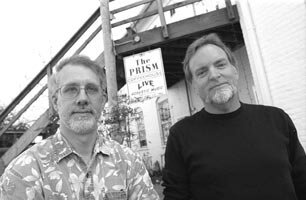
Pete Vigour and Jim Quarles want volunteer elections to take place at the Prism in May.
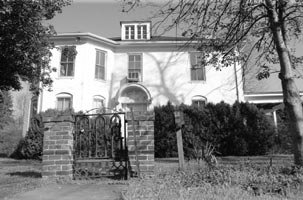
The Prism building, seen here from Rugby Road, is owned by Westminster Presbyterian Church.
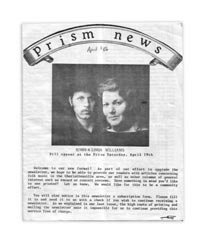
An April 1986 Prism newsletter announces an upcoming performance by Robin and Linda Williams on the cover. Other events that spring: A performance by honky tonk/rock band Buzzard Luck, and the Prism's 20th anniversary celebration.
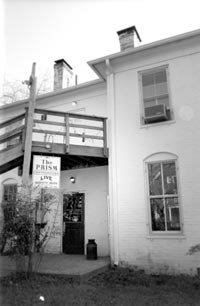
Showgoers enter the smoke-free, alcohol-free venue from the Gordon Avenue side of the building, pictured here.
PHOTOS BY JEN FARIELLO
#